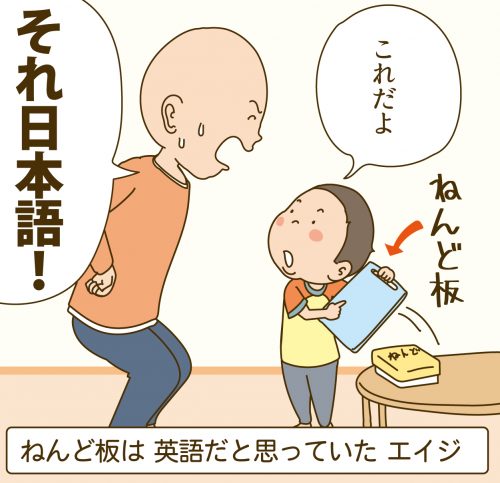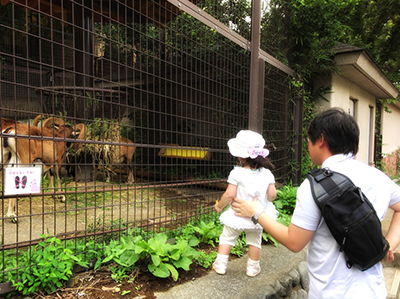Table of Contents
- Parenting Manga “Let’s Enjoy English Quiz with Parents and Children!
- Let’s learn while having fun! Try English with Dad!
Parenting Manga “Let’s Enjoy English Quiz with Parents and Children!






Profile
A1
After working for a design company in Tokyo, he became a freelance illustrator. He is a hard-working father who produces animation, manga, and illustrations, including winning the Yubari International Fantastic Film Festival’s International Short Film Showcase Division Excellence in Animation Award.
Let’s learn while having fun! Try English with Dad!
As one way to deepen communication between parents and children,
How about incorporating English play into your daily life?
English education is becoming increasingly important, as English will be introduced in elementary schools in earnest from FY2020.
Let fathers create an opportunity for their children to develop an interest in English at an early age.
Bring English into your home!
Ms . Mariko Shimizu, a licensed elementary, middle, and high school English teacher with over 30 years of experience teaching English to children and writing for a variety of media, talked about how to incorporate English at home and at play.

English education doesn’t need to be rushed.
Have you ever thought, “I wish I could speak English, too,” when you meet someone who speaks English or go to visit someone overseas? In recent years, we have become an increasingly global society, and many families want their children to learn English from an early age because they believe that using English is now essential.
The first thing I would like to say is that there is no need to panic so much.
For children, learning English should be considered an extension of play and a fun way to communicate.
The important thing is not to make the child dislike English at an early age, and for the child to enjoy using English himself.
In addition, since around 2000, more and more children have been attending international preschools, which provide English-language childcare for preschoolers, and international schools, which provide English-language education for elementary school students and above.
While there are educational benefits of diversity, there are also cases where children spend less time learning Japanese during the school years, and even in the 6th grade they may not be able to write their own names in kanji, or when parents speak to their children in Japanese, their replies may be in English. I’m sure you have various ideas, but my subjective view is that it would be fine to communicate mainly through play to familiarize yourself with English until the early elementary school years or so, and then at least learn English from there.
Let them get used to English by ear!
It is said that exposure to English by “ear” at an early age affects the speed of learning English from elementary school onward. (*1). Therefore, even if you are not good at English, it is okay to try to use simple words and phrases in everyday situations, even if you are not good at English. Let your child see scenes where mom and dad are using English in a fun way.
For example, when you go out with your child, you might say, “Are you ready?” When you are going out with your child, for example, you may say, “Are you ready? In such cases, you might say “Are you ready? or “Let’s Go! to give them a chance to catch the phrase by ear.
When you wake up in the morning, you say “Good morning! Good night!” when they go to bed at night, “one, two, three, four…” when they wash their toes in the bath, and “Wash, Wash, Wash! Wash, Wash, Wash!” and so on in rhythm. Just by using simple phrases, you can feel the fun of English.
It is a good idea for moms and dads to enjoy the time they spend with their children and actively try to use simple phrases.

On the other hand, refrain from asking the child to see if he or she has learned or can do it.
It feels like a kind of test for children, and they end up hating English.
Communication that praises when they remember and discourages when they don’t is a mindset that tries to meet parental expectations, and the fun disappears.
Ideally, communication should be like a child teaching his/her father, for example.
Dad asks, “Hey, what’s watermelon called? the child replies, “It’s watermelon! It is important for the father to set up a conversation like this and get the hang of enjoying communication.
Let’s play in English with Dad!
Next, let us introduce you to the English you will be exposed to while playing.
Again, the emphasis is not on learning conversational English, but on “hearing” the words and phrases, and never in a rigid “study” atmosphere.

Adopt a moniker.
For example, try incorporating English into imitation games, such as a father imitating an airplane and putting his child on his back while saying “Airplane,” or imitating a driver and pretending to be a vehicle, such as a cab or bus.
You can also play with English by simply saying “Higher and higher!
In this way, you can add an element of English to your physical activities.

Also, a day at the zoo is a good opportunity to use English words!
When we get home, Dad will say, “I want to be an elephant! I’m a hippo! Children can also say the name of their favorite animal in English when they request their dad to imitate them.
Also, gesture to the gorilla’s walk, for example, “What animal? Yes, it’s a gorilla.” (What animal? Yes, it’s a gorilla. Yes, it’s a gorilla!) (What animal? Yes, it’s a gorilla.) You can also use a quiz-style exchange like this.
Since this is English communication that can be done after a visit to the zoo, they will learn many animal names through “experience” and “memory”.
As they repeat this kind of English play, the “iwonabee” sound of “I want to be…” (~ want to be) will remain in their ears.
Even if you do not intend to learn, you can naturally learn the unique rhythm of English through communication between parents and children while using your body.

The sole purpose is communication and play.
What you should not do is try to force them to learn it or force them to pronounce it correctly.
It is a good idea to let young children experience the rhythm and sounds, so that they feel like they can say them before they know it.
Recently, there are facilities such as TOKYO GLOBAL GATEWAY that are designed for the use of English.
One way to play is to go to such places and create opportunities for exposure to English.
What is TOKYO GLOBAL GATEWAY?
A completely new type of hands-on English learning facility operated by TOKYO GLOBAL GATEWAY Inc. under the policy of the Tokyo Metropolitan Board of Education, in collaboration with the public and private sectors.
Away from everyday life, visitors can fully experience the global world in a different environment in a cityscape designed to look like a foreign country.
In addition to school-based use by elementary, middle, and high school students, a wide variety of programs are available for individual applicants, from young children to adults.
https://tokyo-global-gateway.com/ 
1 See references below.
J. Oates A. Grayson, J. (ed.) (2010) (translated by Igari, Yukio) How Children’s Cognition and Language Develop: Developmental Psycholinguistics for Early English Language Education, Matsukasha.
Mariko Shimizu
A website that conveys the “current state of English for young children” based on the findings of experts.
English for Young Children.”
https://preschooler-english.com/about/

If you try to deepen parent-child communication through English rather than aiming to have children learn English, children may naturally come to love English.
We hope that fathers will enjoy themselves and try to incorporate English play as part of their communication at home.














